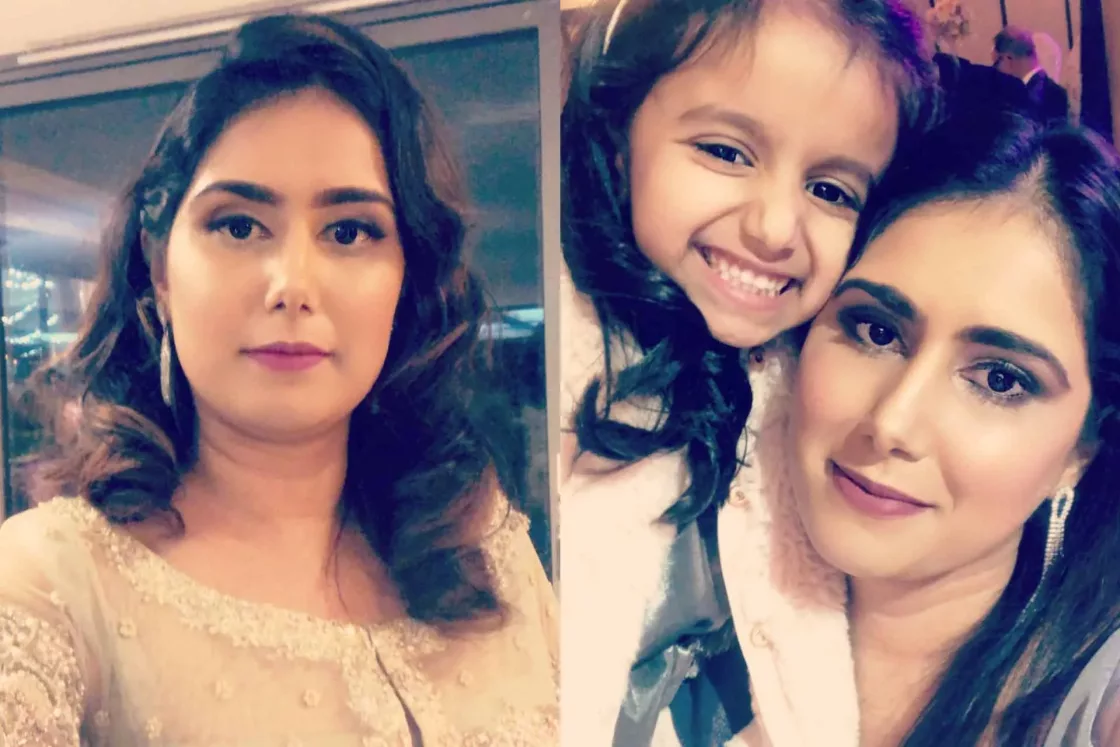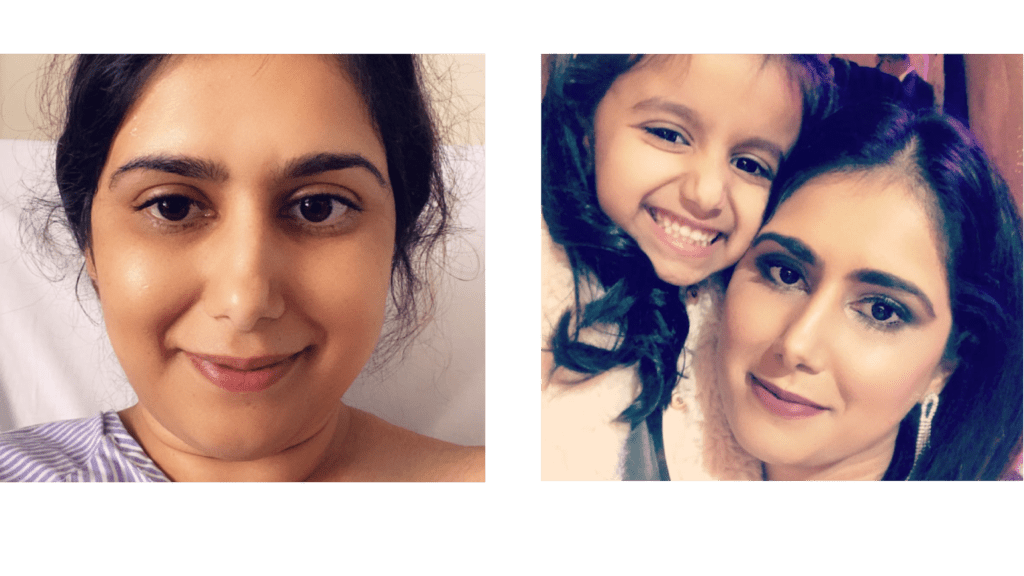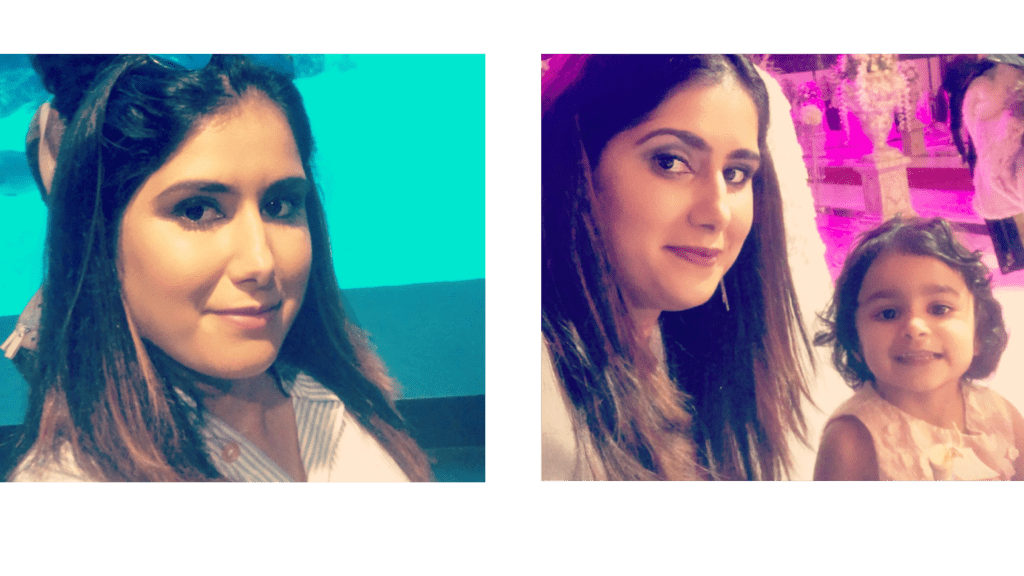
At 34, in the midst of the Covid-19 pandemic, Nahila was diagnosed with breast cancer after noticing an inversion on her breast. We spoke with Nahila about why she decided to get a second opinion, why she now feels differently about her body, and why people can often feel reluctant to talk about breast cancer within the South Asian community.
I will openly admit I was not one of those people that checked my chest. I didn’t learn about it in school, and I’d never been prompted to do it. I was aware that breast cancer was more common in women over fifty and was aware of the screening programme, but no one from my family had previously been diagnosed and so I didn’t really give it much thought.
I knew you could be diagnosed at any age, however I didn’t expect it to happen to me and never checked my breasts for lumps or changes.
At the start of the pandemic, at the age of 34, I noticed an indent or dimple on my breast. What made me notice it was the fact that it was visible, otherwise it would have gone undetected as I never checked my chest. Normally I’m always rushing around, out early and back late, but because of the pandemic, I noticed the change. I thought I’d mention it to my GP and put in a request to chat with them at the weekend. On the Monday morning, the GP contacted me and asked if we could do a video call. She confirmed she could see the inversion and told me, “at your age I wouldn’t worry about it, get in touch if it gets worse.” At this stage I thought I’d done my bit in seeking medical advice and wasn’t worried about it.
As lockdown began to ease in the June of 2020, I went to see the nurse. I had no intention of bringing up my chest, but I got a feeling when I was there that I should ask the nurse to take a look. After examining me, she told me she would refer me for an urgent 2-week referral for a mammogram at the breast clinic. At this stage, I still thought it would just be a cyst and really wasn’t worried. When I went to the hospital I was checked initially by a nurse who told me she could feel a lump. She went through the process of the mammogram with me and asked if they could inject some dye so they could get better visibility and take some biopsies.
After taking the biopsies, the doctor informed me that I had breast cancer. I was really shocked as I didn’t expect to find out so quickly. I was on my own, in the midst of the pandemic, and hadn’t even told anyone that I’d had a concern or that I was going to the appointment.

I have historically been someone who puts a smile on my face and gets on with things without talking about how I’m really feeling. It was hard having to tell my family and friends as it came so out of the blue. My whole family was really upset and emotional about my diagnosis. They all offered to come with me to my appointments, but I wanted to be able to make my own decisions. I felt like this was about me and I had to choose what I felt was best, so I chose to have a mastectomy.
I have always been someone who has struggled to talk about how I feel, so I mainly kept the way I was feeling to myself, but I really struggled after my mastectomy. I lost a lot of my confidence and found it hard to get used to only having one breast. The only people who have seen me undress are at the hospital as I can’t bear for people to see me. My sister had to help me wash my hair following my surgery, but at that stage I still had a bandage over my scar. I used to be one of those people who would prance around in my underwear, but now I even get mortified showing medical professionals my body. A few times, when it hasn’t been my normal consultant checking me over, I’ve burst into tears. In the past 5 weeks I have been recovering from having surgery to insert an expander, in preparation for my reconstruction, I still don’t look in the mirror. Before, I could quite easily look in a mirror, fully naked – I liked my body. Now, looking at my body upsets me. I avoid public settings and hate being around people. I feel uncomfortable in my own skin.

Up until recently, I only shared my story with my immediate family because I didn’t want to be pitied or talked about. In a South Asian community, sometimes stuff like this becomes a hot topic of discussion and I didn’t want to be talked about or pitied. I’m not defined by having breast cancer.
In our community, especially the older generation can be really reluctant to talk about these things with their GP. They would never have raised their concerns again after being dismissed once and it could have been a worst case scenario for them. I could have ignored my concerns and the cancer could have spread. Community leaders aren’t discussing these things and it’s a real shame because the statistics aren’t good. In a South Asian community, there is an attitude of “well I’ve done it once and I won’t bring it up again as it was embarrassing enough the first time and I was dismissed.” I don’t want people to brush anything under the carpet because they’ve been dismissed by their GP. It’s really important to check and to stand up for yourself if you know it’s not right for you.
I knew deep down, even though my doctor said it was nothing to worry about, that an indentation in your breast is a sign of breast cancer. In hindsight, I should have persisted and asked for a referral earlier, or asked for a physical examination. Gone are the days when you’d go to your GP practice and see the same doctor each time. It takes a lot for women, especially Asian women, to come forward because it can be so embarrassing. I’m younger so I had the confidence, but no one should be dismissed.
I managed to catch my cancer when I did, if I hadn’t raised my concerns again with my nurse I could have had another outcome.
It definitely gets easier with time, but I’d rather not have been put in this situation. As women, we can often be our own worst critics and we push ourselves, not wanting to upset others. I’m taking time to look after myself now, listening to how I’m feeling and telling myself I don’t always need to be strong.
I’m vigilant now and check my chest regularly. I was one of those people that always thought these things happen to other people, but I’m testament that it can happen to you.
Everyone thinks that doctors are busy, so you wouldn’t want to waste their time, but if you’ve noticed a change or if something doesn’t feel right, you shouldn’t be hesitating. Your health should come first and we should be making time to prioritise our health. I have had a positive outcome, despite the difficulty. I’m cancer-free, fit, and well, and I want that to be the case for more people.
If you notice something that isn’t normal for you, it’s important to get it checked out with your doctor. Click below to find more information about how to check your chest, and what changes you should keep an eye out for.